While electric bass guitar strings are known for their durability compared to regular guitar strings, replacing them regularly is crucial for maintaining your bass guitar’s health and optimizing your sound. Fresh strings can dramatically improve your bass tone, injecting vibrancy and clarity.
But with so many options available – different bass guitar types (long scale, short scale, fretless, acoustic) and diverse musical genres (from folk to metal) – choosing the right strings can feel overwhelming.
This guide simplifies your search by presenting a curated list of the best electric bass guitar string sets on the market. Based on hands-on testing and expert evaluations from myself and my colleagues at MusicRadar, this list considers various tonal preferences, playability, string longevity, and budget considerations. Finding the ideal set will significantly influence your desired tone and playing comfort.
Whether you’re a beginner ready to restring your bass for the first time or a seasoned bassist seeking fresh inspiration, you’ll discover suitable options here. Resisting the urge to simply grab the cheapest or most readily available strings and investing a little research will lead you to a set that truly complements your sound and playing style.
Currently, for modern music styles, the Ernie Ball Regular Slinky strings are our top recommendation. They offer excellent value and are a favorite among professional and rock bassists. If budget is a primary concern, the Fender 7250M Roundwound strings are our current top pick for beginners and budget-conscious players.
Top Picks for Electric Bass Guitar Strings
This section explores the Best Electric Bass Guitar Strings across different categories, ensuring there’s an ideal set for every bassist’s needs.
Best for Modern Styles
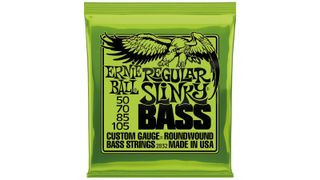 Best bass strings: Ernie Ball Regular Slinky Nickel Bass
Best bass strings: Ernie Ball Regular Slinky Nickel Bass
Image credit: Ernie Ball
Alt text: Ernie Ball Regular Slinky nickel bass strings, best for modern bass styles.
1. Ernie Ball Regular Slinky Nickel Bass – Industry Standard for Contemporary Bass Tones
Expert Review:
Specifications:
- Winding: Roundwound
- Material: Steel core with nickel-plated steel winding
- Tone: Bright, Clear, Modern
- Available Gauges: 40-95, 45-100, 45-105, 50-105, 55-110
Reasons to Buy:
- Delivers a bright, contemporary sound ideal for modern music
- Highly affordable and widely available
- Industry standard and used by countless professional bassists
Reasons to Avoid:
- Not the best choice for achieving authentic vintage bass tones
Ernie Ball Regular Slinky Nickel Bass strings are a true classic and an industry benchmark, favored by a vast number of professional bass players globally. These strings are celebrated for their modern sonic character, providing a growling low end and a crisp, bright high end. Slinkys excel in modern rock, pop, and metal genres, offering less of the warmer, mellow tones associated with vintage music. Personally, I’ve found them particularly responsive and well-suited for slap bass techniques.
For bassists who are new to bass guitar restringing, the Ernie Ball Slinkys are an excellent starting point. They offer a balanced brightness that isn’t overpowering, positioning them as a fantastic mid-range string set and a solid reference point for evaluating other bass strings. In my experience, they represent excellent value and performance.
Best Bass Strings for Beginners
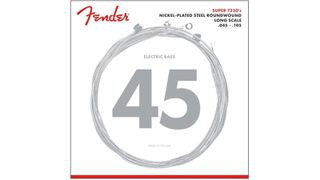 Best bass strings: Fender 7250M Roundwound
Best bass strings: Fender 7250M Roundwound
Image credit: Fender
Alt text: Fender 7250M roundwound electric bass strings, best for beginner bassists.
2. Fender 7250M Roundwound – Quality and Value for Bass Guitar Newcomers
Expert Review:
Specifications:
- Winding: Roundwound
- Material: Steel core with nickel-plated steel winding
- Tone: Bright, Trebly, Versatile
- Available Gauges: 45-105, 45-125 (5-string), 45-100, 40-115, 40-100, 45-110, 45-105
Reasons to Buy:
- Exceptional quality for a budget-friendly price
- Strings settle in quickly and maintain tone
- Good lifespan for extended playing
Reasons to Avoid:
- Not optimized for vintage-style bass tones
In my professional opinion, the Fender 7250M bass guitar strings offer remarkable value, especially for their price point. As a budget-conscious option, these Fender strings provide a comfortable feel, impressive durability, and achieve a desirable “sweet spot” in tone after a brief break-in period. Initially, I noticed a pronounced brightness and treble presence, but the 7250Ms mellowed out after a few playing sessions, developing a more rounded and balanced sound.
I have found no significant drawbacks in terms of feel or playability with these Fender strings, especially considering their affordable cost relative to their build quality. The 7250Ms are well-suited for a wide range of modern music genres, particularly excelling in rock and pop. However, bassists seeking authentic vintage tones might prefer strings with a mellower character.
Best Flatwound Bass Strings
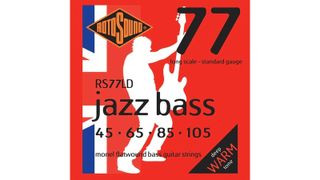 Best bass strings: Rotosound Jazz Bass 77
Best bass strings: Rotosound Jazz Bass 77
Image credit: Rotosound
Alt text: Rotosound Jazz Bass 77 flatwound electric bass strings, ideal for jazz bass tone.
3. Rotosound Jazz Bass 77 – The Premier Choice for Flatwound Tone
Expert Review:
Specifications:
- Winding: Flatwound
- Material: Steel core with Monel winding
- Tone: Deep, Warm, Articulate
- Available Gauges: 40-100, 45-105, 50-110, 45-130 (five-string), 40-90 (short scale), 40-90 (medium scale), 45-105 (extra long)
Reasons to Buy:
- Offers a more contemporary sound than traditional flatwound strings
- Tonally versatile for various genres
- Favored by legendary bassists across genres
Reasons to Avoid:
- The flatwound feel may not appeal to all players
- Higher price point compared to roundwound options
Rotosound Jazz Bass 77 strings boast an impressive legacy, having been used by iconic bassists such as Phil Lynott, Roger Waters, John Deacon, Glen Matlock, Sting, and Dee Murray (Elton John), among many others. This distinguished roster of players highlights the wide range of tones achievable with these classic Rotosound bass strings.
Compared to the typically warmer sound of traditional flatwounds, the Roto 77s offer a brighter and deeper tone, making them particularly well-suited for ’70s rock. However, they also possess sufficient frequency range for contemporary blues-rock and modern jazz styles. In my experience, they strike an excellent balance between the warmth of flatwounds and the demands of more modern musical styles.
Best All-Round Bass Strings
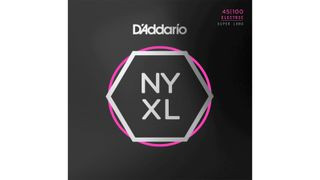 Best bass strings: D’Addario NYXL Bass
Best bass strings: D’Addario NYXL Bass
Image credit: D’Addario
Alt text: D’Addario NYXL electric bass strings, best for all-around bass playing styles.
4. D’Addario NYXL Bass – The Versatile Performer for Any Genre
Expert Review:
Specifications:
- Winding: Roundwound
- Material: High carbon steel core with nickel-plated steel winding
- Tone: Balanced, Versatile, Rich
- Available Gauges: 40-95, 45-100, 45-105, 50-105, 55-110, 45-125 (five-string), 45-130 (five-string), 32-130 (six-string)
Reasons to Buy:
- Available in sets for four, five, and six-string basses
- Balanced tone that suits any musical style
- Premium feel and high-quality construction
Reasons to Avoid:
- May not be bright enough for players seeking aggressive treble
Engineered as a truly versatile bass string set with a balanced tonal profile suitable for all musical genres, the D’Addario NYXLs compete in the highly competitive mid-price range. They are positioned at a slightly higher price point than the consistently popular Ernie Ball Slinkys.
In my assessment, the D’Addario NYXLs are an excellent choice if you find Slinkys to be on the brighter side. I observed that the NYXL set offers a warmer initial tone, without excessive “new string zing,” yet maintains ample midrange clarity and rich harmonics. They also feel quite smooth to the touch, and I noted that finger noise is minimal.
This overall balanced tonal character makes the NYXLs particularly well-suited for five and six-string bass guitars, where players often explore a broader tonal range.
Best Tapewound Bass Strings
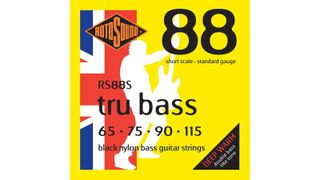 Best bass strings: Rotosound Tru Bass 88
Best bass strings: Rotosound Tru Bass 88
Image credit: Rotosound
Alt text: Rotosound Tru Bass 88 tapewound electric bass strings, best for upright bass tones.
5. Rotosound Tru Bass 88 – Vintage Warmth and Upright Bass Tones for Electric Bass
Expert Review:
Specifications:
- Winding: Flatwound (Nylon Tapewound)
- Material: Stainless steel core with nylon tape winding
- Tone: Deep, Warm, Vintage, Acoustic-Style
- Available Gauges: 65-115 (short scale, medium scale, long scale, extra long scale), 65-135 (five-string)
Reasons to Buy:
- Authentic vintage, upright bass vibe
- Excellent for fretless bass guitars
- Replicates upright/acoustic bass tones on electric basses
Reasons to Avoid:
- Not particularly versatile for modern, bright tones
For bassists seeking acoustic and upright bass-like sounds from a standard electric bass, tapewound strings are essential – and Rotosound Tru Bass 88s are the definitive choice. Their signature tones are evident in iconic recordings like The Beatles’ Abbey Road (Paul McCartney), The Jam’s All Mod Cons (Bruce Foxton), David Bowie’s Diamond Dogs, and Lou Reed’s Transformer (Herbie Flowers on both).
The Tru Bass 88 strings feature a metal core encased in a flatwound nylon wrap, which, to my ears, produces a deep, warm tone with a remarkably smooth feel. They also offer enhanced dynamic range and touch sensitivity that traditional metal strings can’t match. While not the most versatile strings for all genres, if an acoustic or upright bass vibe is your goal, tapewounds, specifically the Tru Bass 88s, are indispensable.
Best Coated Bass Strings
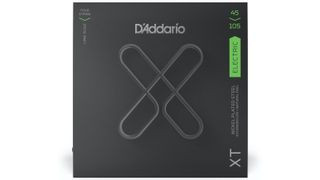 Best bass strings: D’Addario XT Nickel Plated Bass Strings
Best bass strings: D’Addario XT Nickel Plated Bass Strings
Image credit: D’Addario
Alt text: D’Addario XT nickel plated coated electric bass strings, best for longevity.
6. D’Addario XT Nickel Plated – Extended Life and Bright Tone in a Coated String
Expert Review:
Specifications:
- Winding: Roundwound
- Material: NY Steel core with coated nickel-plated steel winding
- Tone: Balanced, Bright, Warm, Long-Lasting
- Available Gauges: 45-100, 45-105, 45-130, 50-105, 37-90 (GS Mini Bass), 32-130 (6-String Bass)
Reasons to Buy:
- Exceptional versatility across musical styles
- Maintains a fresh string sound for extended periods
- Feels remarkably similar to uncoated strings
Reasons to Avoid:
- May be too bright for players who prefer a very mellow tone
Coated strings are designed to retain that desirable bright, “fresh string” sound for a longer duration, reducing the frequency of string changes. The D’Addario XTs excel in this regard, providing long-lasting performance. While some bassists are hesitant about the feel of coated strings, D’Addario has successfully engineered the XTs to deliver the benefits of coating while preserving much of the feel of traditional uncoated strings, a feature I confirmed during my testing.
These nickel-plated steel bass strings offer a well-rounded balance of warmth and brightness, making them a superb all-purpose string set. For bassists who play in diverse musical contexts or multiple bands, the D’Addario XTs are an ideal choice. They maintain a new string sound for longer, are highly durable, and feel more like conventional strings – a winning combination.
Best Bass Strings for Clarity
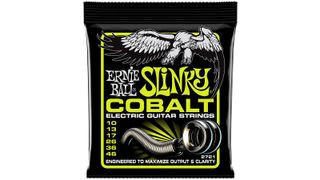 Best bass strings: Ernie Ball Regular Slinky Cobalt
Best bass strings: Ernie Ball Regular Slinky Cobalt
Image credit: Ernie Ball
Alt text: Ernie Ball Regular Slinky Cobalt electric bass strings, best for clear and defined tone.
7. Ernie Ball Regular Slinky Cobalt – A Modern Evolution in Bass String Technology
Expert Review:
Specifications:
- Winding: Roundwound
- Material: Tin-plated high-carbon steel core with iron-cobalt alloy winding
- Tone: Mid-Scooped, Defined Bass and Treble, High Output
- Available Gauges: 45-100, 45-105, 50-105, 55-110, 45-130 (five-string)
Reasons to Buy:
- Enhanced low-end response and crisp, clear high frequencies
- Smooth string surface for improved playability
Reasons to Avoid:
- Limited five-string set availability and no six-string options
- Higher price point reflects innovative materials
Ernie Ball’s Slinky Cobalt strings generated considerable excitement upon their release a few years ago. Do they live up to the hype? In my experience, largely yes. If you’re seeking high-output strings with deep lows, crystal-clear highs, and a subtle mid-range scoop, the Cobalts are an excellent option. They are well-suited for genres like prog and metal, funk, and slap bass, leaning towards contemporary rather than classic tones. I haven’t detected much vintage warmth in their sound profile.
From a playability perspective, the Cobalts are impressive. The iron-cobalt alloy produces a smoother and more “slinky” feel than most strings, approaching the smoothness of flatwounds, which facilitates effortless movement across the fretboard. However, Ernie Ball’s technological advancements come at a cost – these are among the more expensive strings in this guide.
Best Bass Strings for Drop Tuning
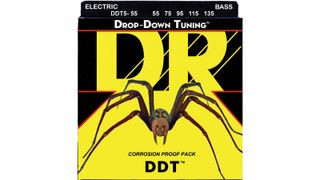 Best bass strings: DR Strings DDT
Best bass strings: DR Strings DDT
Image credit: DR Strings
Alt text: DR Strings DDT electric bass strings, best for drop tuning stability.
8. DR Strings DDT (Drop Down Tuning) – Optimized for Lower Tunings Without Compromise
Expert Review:
Specifications:
- Winding: Roundwound
- Material: High-carbon steel core with stainless steel winding
- Tone: Bright with Treble Roll-off, Focused Low End
- Available Gauges: 40-100, 45-105, 50-110, 55-115, 65-125, 40-120 (five-string), 45-125 (five-string), 45-130 (five-string), 55-135 (five-string)
Reasons to Buy:
- Reliable tuning stability and balanced string tension in drop tunings
- Enables drop tuning without excessively heavy string gauges
Reasons to Avoid:
- Warmer sound compared to some brighter stainless steel strings
DR Strings advertises their DDT (Drop Down Tuning) strings as maintaining intonation and providing more natural string tension when using lower tunings. Traditionally, bassists would switch to heavier gauge strings for drop tuning, which can sometimes lead to setup adjustments and may not always be practical.
The key advantage of DDTs is that they eliminate this need. A single set of DDTs can handle a wide range of tunings effectively, feeling neither too tight in standard tuning nor overly loose when tuned down. This makes them an ingenious solution for bassists who frequently use drop tunings.
Best Bass Strings for Acoustic Bass Guitars
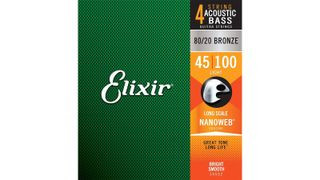 Best bass strings: Elixir Nanoweb Acoustic
Best bass strings: Elixir Nanoweb Acoustic
Image credit: Elixir
Alt text: Elixir Nanoweb Acoustic electric bass strings, best for acoustic bass guitars.
9. Elixir Nanoweb Acoustic – Coated Longevity for Acoustic Bass Tone
Expert Review:
Specifications:
- Winding: Roundwound
- Material: Coated bronze (80/20 copper/zinc)
- Tone: Bright, Trebly, Clear, Long-Lasting
- Available Gauges: 45-120 + Nanoweb Coating for extended life
Reasons to Buy:
- Long-lasting tone due to Nanoweb coating
- Crisp and lively acoustic tone
Reasons to Avoid:
- Limited gauge options (only one available)
- May be perceived as too bright by some players
Elixir is highly regarded for its range of coated strings for standard six-string acoustic guitars, and they’ve successfully applied their expertise to acoustic bass guitars with the Nanoweb Acoustic strings.
I found these strings to deliver a crisp, vibrant tone, characteristic of 80/20 bronze strings, which will be familiar to users of Elixir’s acoustic guitar sets.
Elixir’s ultra-thin Nanoweb coating protects the string from dirt and grime accumulation between the windings, resulting in extended string life and lasting tone. This is a significant benefit, especially considering their premium price point. While some might find them overly bright, I believe this is a matter of personal tonal preference.
Best Bass Strings for Short Scale Bass Guitars
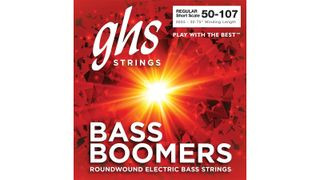 Best bass strings: GHS Bass Boomers Short Scale
Best bass strings: GHS Bass Boomers Short Scale
Image credit: GHS
Alt text: GHS Bass Boomers Short Scale electric bass strings, best for short scale basses like Mustang.
10. GHS Bass Boomers Short Scale – Optimized Tone for Short Scale Basses
Expert Review:
Specifications:
- Winding: Roundwound
- Material: Hex core with nickel-plated steel winding
- Tone: Bright with a Low-Mid Bump, Punchy
- Available Gauges: 45-95, 50-107
Reasons to Buy:
- Exceptionally versatile for various genres
- Bold and articulate tone
- Perfectly suited for Mustang and other short scale basses
Reasons to Avoid:
- Not optimized for standard long-scale bass guitars
Short-scale bass guitars have experienced a resurgence in popularity recently, driven by models like the Squier and Fender Mustang, and the Ibanez Talman. The comfort and playability of these instruments have made them favorites among both modern players and beginners. But what are the best strings for 30-inch and 32-inch scale basses?
In my opinion, the GHS Bass Boomers short-scale strings are the answer. Available in two gauges (45-95 and 50-107), they provide both lighter and slightly heavier options. Both sets feel thicker than standard strings, which helps short-scale bass guitars produce a surprisingly full and powerful sound.
Tonally, GHS Bass Boomers tend towards the brighter side, with a noticeable emphasis in the low-mid frequencies. Offering considerable punch while maintaining clarity, GHS has done an excellent job of enhancing the sonic capabilities of short-scale basses like the Mustang. These strings are highly versatile, making them a great choice for bassists who play across a range of musical styles.
FAQs: Choosing the Right Electric Bass Guitar Strings
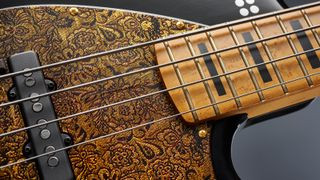 Close up of bass strings
Close up of bass strings
Image credit: Future
Alt text: Close up detail of electric bass guitar strings, winding and texture.
When selecting the best bass strings for your needs, several key factors come into play. Sound and playability are arguably the most critical. The material composition of the string significantly influences its tonal characteristics. While different brands utilize proprietary alloys with varying ratios, generally, the best bass strings typically feature a steel core with outer windings made of either stainless steel or nickel-plated steel.
What Bass String Material Should I Choose?
Stainless Steel: Stainless steel strings are known for their bright tone. While they still deliver a solid low-end punch, they also provide added top-end bite and clarity. Stainless steel bass strings are particularly well-suited for contemporary music genres like modern rock, punk, pop, and metal, where their inherent mid-scoop characteristic is often desirable.
Pure Nickel: Pure nickel wound bass strings offer a significantly warmer sound, with less emphasis on both the low and high frequencies, resulting in a mellower overall tone.
Nickel-Plated Steel: Nickel-plated steel strings, as the name suggests, strike a balance between the warmth of pure nickel and the brightness of stainless steel. They offer a versatile compromise, making them ideal for bassists who need to cover a wide range of musical styles, from Motown to pop-punk, on a single bass.
String Materials at a Glance:
- Nickel: Pure nickel strings produce a warm, vintage tone without excessive treble or low-end. Perfect for capturing the authentic sounds of ’50s and ’60s pop, soul, and rock.
- Stainless Steel: Tonally opposite to nickel strings, stainless steel offers clarity and brightness across the entire frequency spectrum, making them excellent for modern musical styles.
- Nickel-Plated Steel: Nickel-plated steel strings provide a balanced compromise between pure nickel and stainless steel, offering a versatile option for bassists who play a variety of genres.
Roundwound vs. Flatwound vs. Tapewound Bass Strings
Another crucial decision in your quest for the best bass strings is choosing between roundwound, flatwound, and tapewound constructions – each imparting distinct sonic and tactile characteristics.
Roundwound: Roundwound bass strings generally offer a balanced tonal profile. They provide ample low-end, a present midrange, and can still deliver a bright top-end. While personal preference plays a significant role, and there’s no objectively “right” or “wrong” choice, roundwounds are typically favored by rock, blues, pop, and metal bassists. You can physically feel the small ridges created by the windings on roundwound strings.
Flatwound: Flatwound strings produce a mellower tone with reduced high frequencies. They typically deliver a warm, full low-end with a punchy lower-midrange thump. Jazz, R&B, and soul bassists often prefer flatwounds for their ability to sit smoothly within the mix. As their name suggests, flatwounds are much flatter and smoother to the touch, facilitating effortless gliding between notes and minimizing string noise compared to roundwounds.
Tapewound: Tapewound strings feature a nylon coating, further enhancing their mellow, vintage-esque tone. If you aim to make your electric bass sound closer to an acoustic upright bass, tapewounds are the way to go due to their exceptionally mellow character. They are incredibly smooth thanks to the nylon coating and enable impressive glissando techniques. Paul McCartney, Herbie Flowers, and Graham Maby are prominent tapewound users, demonstrating their appeal to discerning bassists.
Choosing the Right Bass String Gauge
MusicRadar’s expert team is dedicated to helping you make informed gear choices. Our musicians and producers spend countless hours rigorously testing products to provide you with the best guidance in selecting your music equipment. Learn more about our testing methodology.
String gauge is another important consideration when finding the best bass strings for you. A thinner gauge might be preferable for beginners as it requires less physical pressure to fret notes. Funk bassists who frequently employ slap and pop techniques often favor lighter or medium gauge strings as well. Conversely, if you regularly use drop tunings, you’ll likely want to consider heavier gauge bass strings for improved tuning stability and string tension.
Coated vs. Uncoated Bass Strings
Coated bass strings are becoming increasingly prevalent. These strings are essentially standard bass strings with a thin protective coating designed to prevent contaminants like dirt, sweat, and skin oils from penetrating between the windings. This coating results in strings that maintain a fresher sound and feel for a longer period. While they typically come at a slightly higher cost, their extended lifespan can offset the price difference by reducing the frequency of string replacements.
How We Select Products
At MusicRadar, we pride ourselves on our expertise in music gear. Our team comprises seasoned musicians and producers with extensive experience in playing, creating, and rigorously testing music products. We are deeply immersed in all things music gear-related, and we leverage this knowledge and hands-on experience from live performances, recording sessions, and rehearsals when curating product recommendations for our guides.
When determining what we believe to be the best bass strings currently available, we combine our direct experience with a wide array of products alongside user reviews and testimonials. We also engage in thorough discussions with our editorial colleagues to reach a consensus on the top products in each category.
Above all, we are musicians ourselves, and our primary goal is to help other players find the right gear for their individual needs. Therefore, we carefully consider factors ranging from budget and features to ease of use and long-term durability in our product selections.
Learn more about how we test music gear and services at MusicRadar.
